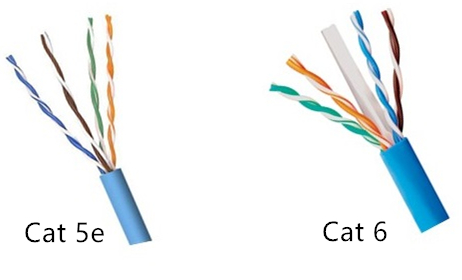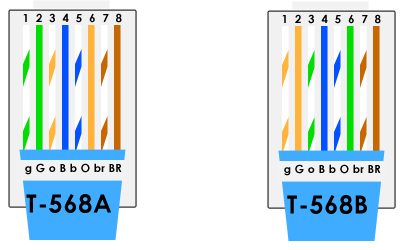As one type of copper cabling, twisted pair wiring is widely adopted for Ethernet networks which wraps the two conductors of a single circuit together. Nowadays, many kinds of twisted pair network cables are available in the market. To specify the cable wiring standards, the Electronic Industries Alliance (EIA) and Telecommunications Industry Association (TIA) have defined twisted pair cables into a series of categories, such as Cat5, Cat5e, Cat6, Cat6a, Cat 7, etc. This article will put emphasis on Cat5e vs Cat6 cable to see their differences and discuss which one to choose for your network applications.

Wiring Standards of Cat5e and Cat6 Cables
Two standards of T568A and T568B can be used to wire Cat5e and Cat6 Ethernet cable. The only difference between T568A and T568B is that the green/green strip and orange/orange strip wire positions are swapped. In general, T568B is more popular for office and commercial networks. But no matter which wiring standard you choose, the most important thing is to continue with the selected standard for consistency. The following picture shows the concrete structure of T568A and T568B wiring.

Differences Between Cat5e vs Cat6 Cable
Data speed is important for cable selections. You have to choose the cable that is equivalent to what is running on it. As for Cat5e patch cable, it can support 1 Gigabit Ethernet. While Cat6 cable can support a higher data rate of 10 Gigabit Ethernet. This is because Cat6 cable performs up to 250 MHz, which is more than twice that of Cat5e cable with 100 MHz.
The common ground of Cat5e vs Cat6 cables is that they are all designed for short distance data transmission because they are made of copper wires. If the cable is used for lower data rate transfer, both Cat5e and Cat6 are able to reach the maximum length of 100 meters. However, when the data rate achieves the maximum speed, the Cat5e cable can only reach 50 meters and Cat6 with 37 meters.
Compared with Cat5e cables, the cost of Cat6 cables is typically 10 to 20% more expensive because of the higher transmission speed. But the price of these cables is comparatively cheap, which only takes up a small portion of the total budget. For the consideration of your application, Cat6 might be a better choice if a higher data rate is required. The additional cost can save you more money in the long run.
Traditionally, Cat5e cable is run for the business telephones. But using Cat6 cable with a phone might be a waste. Cat6 is suited for broadband video and digital video applications because of the lower signal losses and better transmission performance at higher frequencies compared with Cat5e.
Can We Use Cat5e With Cat6 Cable?
The answer is yes. Regardless of a possibly different coating on the pins, Cat5e and Cat6 are both employing the RJ45 plug standard which makes them compatible with each other. But you can only receive a limited speed of the lowest link in the chain. Therefore, if you want to receive the best performance of cables, you should better use the matching components for your application.
Conclusion
As regard with Cat5e vs Cat6 cable, they are two different categories of twisted pair cabling. The major difference between them is the data speed. Cat6 has a higher speed than Cat5e which accordingly varies its maximum length, cost, and application. All these factors are important for you to make a choice between Cat5e and Cat6. Moreover, if a higher speed over long distance is demanded, fiber optic cables might be a better solution.
Related Article:
Quick View of Ethernet Cables Cat5, Cat5e And Cat6
Home Ethernet Wiring Guide: How to Get a Wired Home Network?
How to Terminate and Install Cat5e, Cat6 Keystone Jacks?
